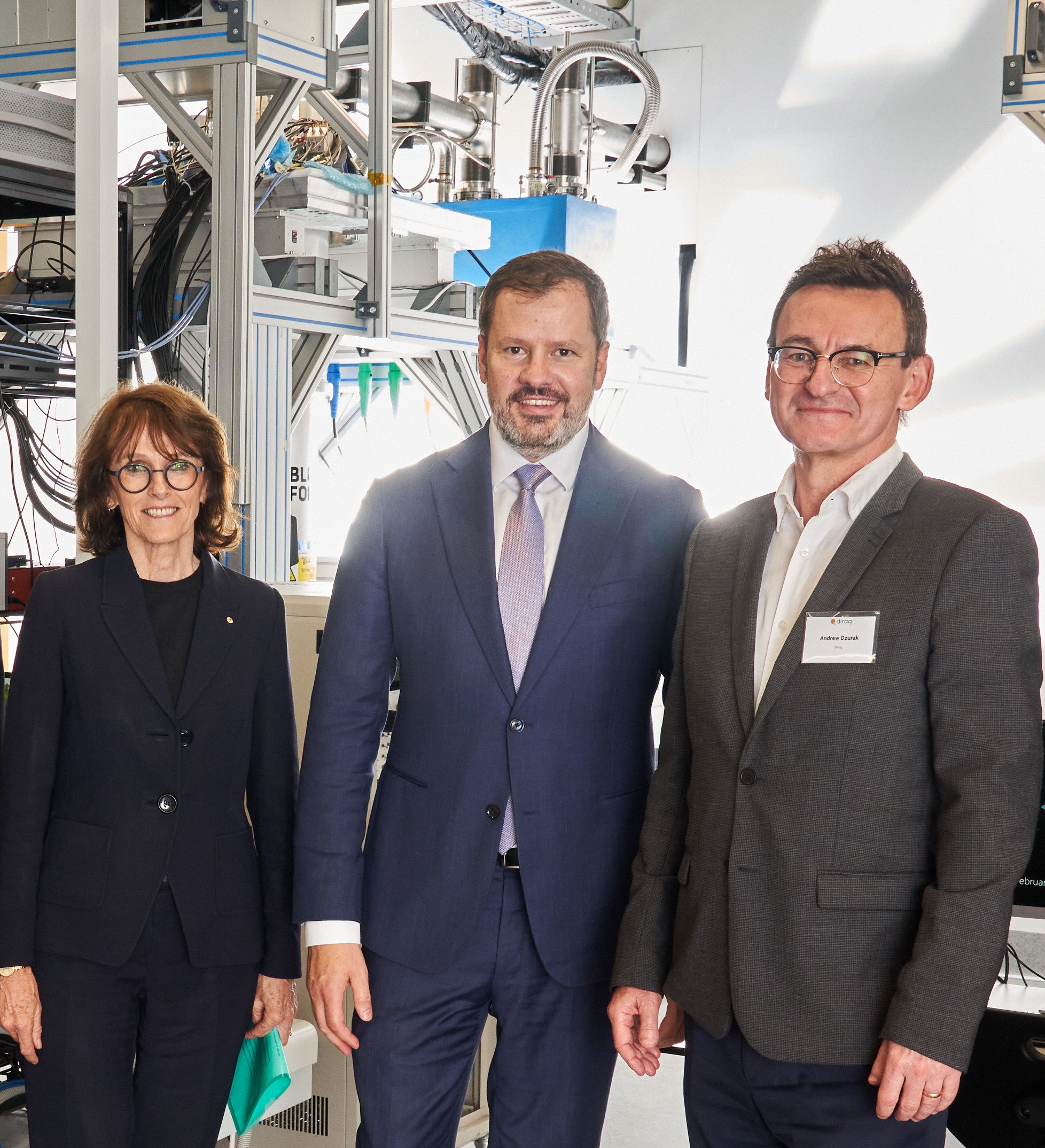Diraq Opens New Commercial Laboratory in Sydney to Propel Era of Fault Tolerant Quantum Computing

Insider Brief
- Diraq announced the official opening of its new state-of-the-art commercial quantum computing laboratory located on the campus of UNSW in Sydney, Australia.
- The lab is 200 square meters and provides a low-vibration and interruption-free environment for quantum measurements.
- Diraq’s lab will help the company leverage today’s semiconductor manufacturing infrastructure to produce silicon chips with billions of qubits.
- Image: Dr. Cathy Foley, Australia’s Chief Scientist, and The Hon. Ed Husic MP, Australian Minister for Industry & Science, join Diraq founder and CEO Andrew Dzurak (right) at opening of company’s commercial lab.
PRESS RELEASE — Diraq, a global leader in quantum computing using silicon ‘quantum dot’ technology, announced the official opening of its new state-of-the-art commercial quantum computing laboratory located on the campus of UNSW in Sydney, Australia.
Equipped with cutting-edge technology and a team of talented scientists and engineers, the lab is a critical step in realising Diraq’s plans to leverage today’s semiconductor manufacturing infrastructure to produce silicon chips with billions of qubits – the fundamental computational units of quantum computing.
Diraq’s new lab is 200 square meters and provides a low-vibration and interruption-free environment for quantum measurements. The lab contains state-of-the-art equipment for the cryogenic testing and precision measurement of silicon quantum devices, with feature sets that are less than the width of a thousandth of a single human hair.
The Hon. Ed Husic MP, Minister for Industry & Science, joined a number of other dignitaries speaking at the official lab opening event, including The Hon. Matt Thistlethwaite MP, Assistant Minister for Defence, Assistant Minister for Veterans’ Affairs, and Assistant Minister for the Republic; Cathy Foley, Ph.D., Australia’s Chief Scientist; Attila Brungs, Vice-Chancellor & President of UNSW, Sydney; Christophe Jurczak, Ph.D., Founder and Managing Partner of Quantonation, Diraq’s latest private investor; and Diraq’s U.S.-based Chair, The Hon. William (Bill) Jeffrey, Ph.D. Dozens of other officials from venture capital firms, quantum companies, academia and government were also in attendance.
“Quantum computers are now moving closer to the assembly line – they’re a major disruptor on an accelerated path to delivery,” said Dr. Foley. “Companies like Diraq are putting Australia in the top tier of countries to capitalise on this. Andrew Dzurak’s quantum dot technology really is world-leading research.”
“Quantonation is delighted to have recently led Diraq’s recent Series A-2 funding round,” said Jurczak. “We chose to invest in Diraq as we see their technology — spins-in-silicon — as the fastest route to realising fault-tolerant quantum computing capable of delivering quantum’s transformative potential on a commercial scale.”
“We are grateful for the overwhelming support from our partners and well-wishers in this major step forward for our company, as well as for their continuing dedication to a thriving quantum computing ecosystem,” said Andrew Dzurak, CEO and founder of Diraq.
“While other quantum computing approaches involve building large, expensive systems, Diraq is focused on developing small, highly integrated silicon chips that can hold many millions and ultimately billions of qubits on a single chip,” said Dzurak. “Diraq’s advantage is the ability for our technology to be fabricated using the same semiconductor processes used to make the chips in modern electronics.”
“With the launch of our new lab and bolstered by recent funding, Diraq is poised to transition seamlessly from prototype development to producing chips through a standard semiconductor foundry,” said Dzurak. “This strategic advancement positions us at the forefront of the quantum computing landscape in order to realise the full economic and commercial potential of quantum computing.”
In addition to funding from private partners, Diraq has secured grants from the U.S. Army Research Office, as well as Australian Government grants including the CRC-P and QCCF. Total funding of Diraq’s technology is USD $135 million.
